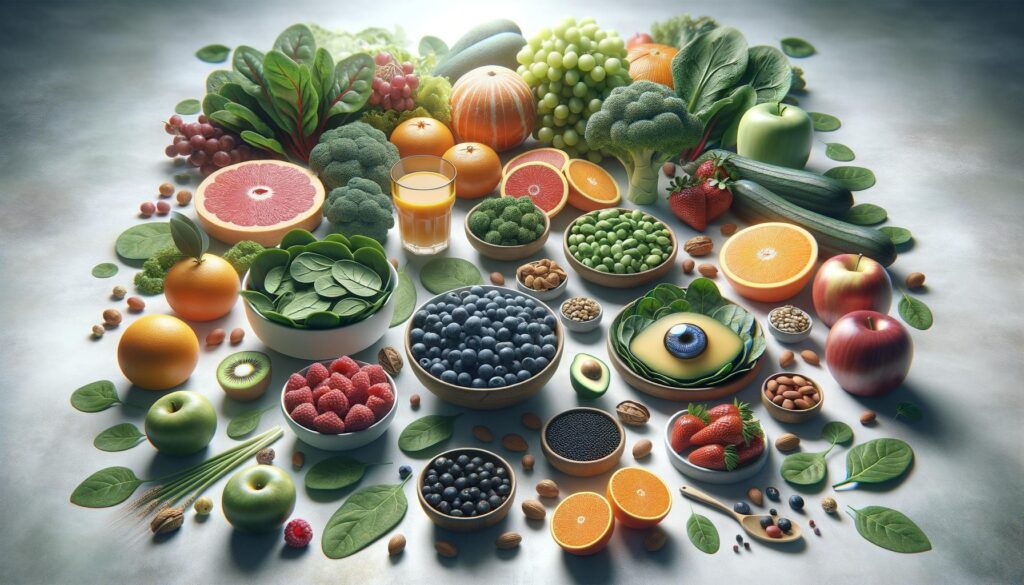Nourishing Your Eyes: Foods to Support Macular Health

The Role of Diet in Macular Health
Macular degeneration is a leading cause of vision loss, particularly in older adults. While genetics and age are factors that influence the onset of this condition, dietary choices play a significant role in managing and even potentially slowing its progression. Consuming a variety of nutrient-rich foods can help nourish the eyes and maintain macular health. Understanding which foods contain the necessary vitamins and minerals can be a crucial step in supporting your vision.
Antioxidant-Rich Fruits and Vegetables
A diet rich in fruits and vegetables is fundamental for eye health, thanks in part to the antioxidants they provide. These compounds help to protect the eyes from oxidative stress, which is a contributing factor to macular degeneration. Some essential foods in this category include:
- Leafy greens such as spinach and kale, which are high in lutein and zeaxanthin, carotenoids known for filtering harmful blue light.
- Brightly colored fruits like oranges and strawberries, rich in vitamin C, an antioxidant that supports blood vessels in the eyes.
- Carrots and sweet potatoes, known for their beta-carotene content, which can be converted into vitamin A, crucial for vision.
Incorporating a variety of these foods into daily meals can significantly contribute to the maintenance of healthy eyes.
Healthy Fats for Eye Protection
Not all fats are created equal, and including healthy fats in your diet can provide support for your eyes. Omega-3 fatty acids, in particular, have been associated with a reduced risk of macular degeneration. These important nutrients can be found in:
- Fatty fish like salmon, mackerel, and sardines, which are excellent sources of omega-3s.
- Flaxseeds and chia seeds, which offer plant-based omega-3s, suitable for those on a vegetarian diet.
- Nuts like walnuts, which not only provide healthy fats but also vitamin E, another beneficial antioxidant for eye health.
Adding these foods into your diet can aid in reducing inflammation and protecting the structure of cells in the macula.
Vital Vitamins and Minerals
An assortment of vitamins and minerals is essential for maintaining eye health. Apart from those found in fruits, vegetables, and nuts, some other nutrients play vital roles:
- Zinc, found in oysters, beef, and pumpkin seeds, supports the health of the retina and helps deliver vitamin A from the liver to the retina.
- Vitamin E, apart from nuts, can be found in sunflower seeds and avocados, helping to protect eye cells from damage.
- Carotenoids, including lutein and zeaxanthin, are available in egg yolks, which can enhance visual function and reduce glare impairment.
Ensuring a balanced intake of these nutrients can foster robust eye health and help manage the risk of macular degeneration.
Whole Grains and Lean Proteins
Your overall dietary pattern, including the consumption of whole grains and lean proteins, can indirectly affect eye health. Whole grains have a low glycemic index, which helps maintain healthy blood sugar levels and reduces the risk of diabetes-related eye problems. Opt for:
- Whole wheat bread, quinoa, and brown rice as sources of beneficial fiber.
- Lean proteins such as chicken, turkey, and legumes, which are vital in providing zinc and other eye-supportive nutrients.
Including these foods within a well-rounded diet supports not only eye health but overall wellness, contributing positively to body systems that work together to maintain vision.
Conclusion: Eat for Your Eyes
Supporting your eye health and managing macular degeneration naturally involves a thoughtful approach to your diet. By prioritizing nutrient-rich foods that offer essential vitamins and minerals, you can foster a favorable environment for eye health. Additionally, adopting a dietary pattern that includes a variety of fruits, vegetables, whole grains, lean proteins, and healthy fats can go a long way in protecting and preserving your vision over time. Remember, while diet alone cannot prevent macular degeneration, it is a powerful tool that enhances your overall strategy for eye health.
